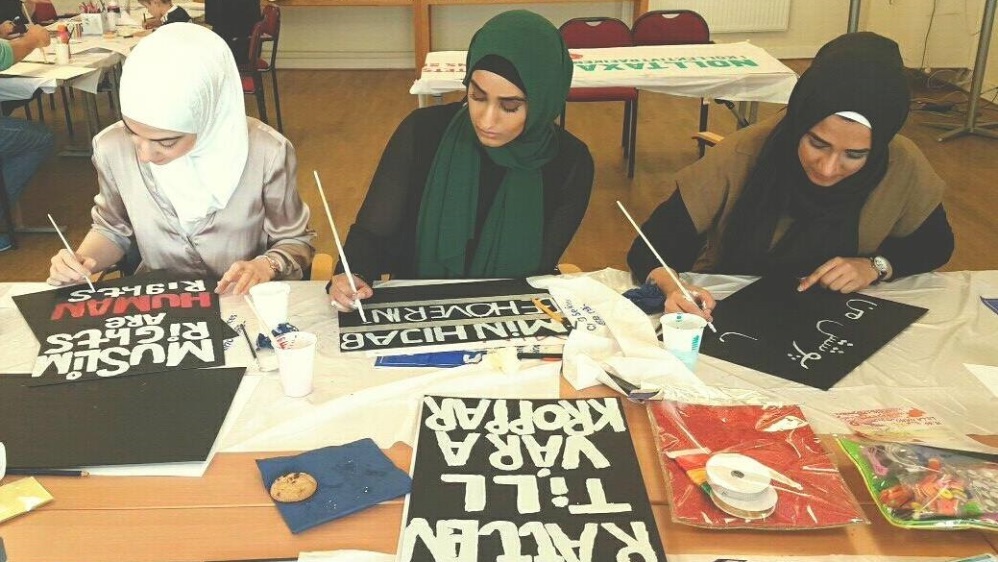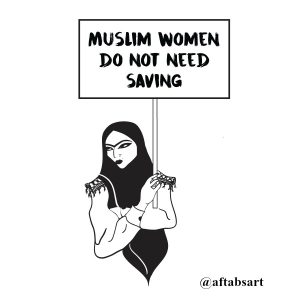STOCKHOLM – On the International Workers’ May Day, rallies crowded the streets of several Swedish cities to call for Muslim women’s right to work while wearing hijab.
“Muslim women here [Gothenburg] don’t usually go out to protests on May Day, so it’s empowering to see so many people from different backgrounds fighting for labour rights,” Maimuna Abdullahi, one of the event organisers, told Aljazeera on Monday, May 1.
“I came out because it’s our society’s responsibility to stand for all of us,” said Gabrielle Guastad, a participant in the march, which was planned by a network of Swedish activists in Gothenburg called The Right to our Bodies.
In the rallies, held in Stockholm, as well as in the cities of Malmo, Gothenburg, Vasteras, Sala and Umea, protesters chanted slogans such as “crush racism”, “my hijab is not your business” and “employment is our right”.
The peaceful protests followed a decision by the Court of Justice of the European Union last March, which allowed private companies to ban employees from wearing visible religious symbols.
The ruling was condemned by Muslims worldwide as a direct attack on women wearing the headscarf in the workplace.
Gothenburg’s event was planned by a network of Swedish activists called ‘The Right to our Bodies’.
Organizers said they were stunned by the silence that followed the EU court ruling – and this prompted them to put together the event.
“There was no solid criticism against the ruling, especially here in Sweden, a country that is hailed for its human rights,” Abdullahi said.
“When we uploaded a video calling for action on May 1, several people across the country called us wanting to organize their own marches, because they too recognize that this EU judgement is a game changer.”

Muslim Art Change Perception
A promotional logo of the event started to go viral online under the #Muslimwomenban hashtag. It was designed by Aftab Soltani, one of the organizers, to “show a visibly powerful Muslim woman and reverse the image of Muslim women as victims of discrimination.”
“It’s an image of a strong hijabi, because the real narrative of resistance isn’t being told,” Soltani told Aljazeera.
“Prior to the ruling, we could encourage each other as Muslim women to at least file lawsuits against discrimination. Legalizing the discrimination forces us to choose between our economic independence and our religious identity,” Abdullahi explained.
“It makes the issue even worse because lawsuits were the only way to know what barriers Muslim women faced in the workplace.”
According to a recent study by the European Network Against Racism (ENAR), workplace discrimination for women who wear the Islamic veil is three-fold, as they are judged for gender, ethnicity and religion.
This limits their career trajectory, since they are forced to either seek job alternatives within the Muslim community or remove the veil.
Before the ruling, the average French Muslim woman wearing the headscarf would have to hand in at least 100 resumes before receiving a reply, according to the ENAR study.
The ENAR study also found that images of Muslim women in the media further exacerbate the discrimination they face.
The political discourse is affected by images of women wearing the hijab that accompany stories about terrorism, domestic violence and gender inequality.
Even though, Abdullahi explained that “the stories we are familiar with as Muslim women are stories of agency and resistance. But, these aren’t the stories we are being told in the public sphere.”
“The only way forward is to continue the resistance, as we won’t choose between our religious identity and our right to employment.”
